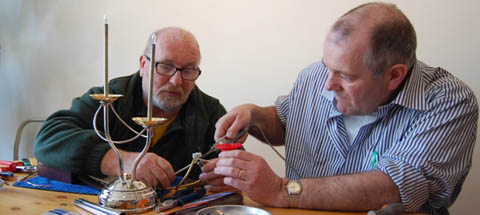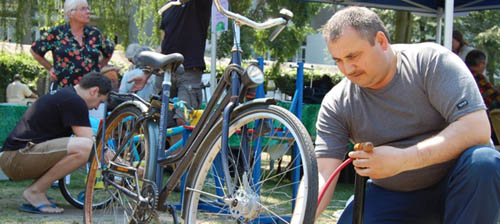All too many of us are ever-eager to upgrade to the latest and greatest whatever. Whether they be computers, washing machines, or clothes, if something goes wrong or next next arrives, we're on to the next purchase.
Part of it, too, is that we don't actually know how to repair our stuff. And our world is set up so it's dramatically easier to cut and run than sit and fix. And so our landfills overflow with slightly damaged goods…a less-than-convenient truth that threatens our economic and environmental health.
This maybe changing. In The Netherlands, mom and former journalist Martine Postma stumbled onto an idea that tacks the word "repair" onto the familiar green mantra, "reduce, re-use, recycle". The result is community-based Repair Cafes where folks come together to fix their broken items. What started as a few neighbors in Amsterdam helping each other out has, two years later, become a much bigger deal with 30 groups springing up around the country.
This year, we’ve seen Mutual Aid in Motion.
From scaling sharing hubs to Mutual Aid 101 trainings, we’re helping communities build the tools they need.
Every dollar fuels lasting resilience – proving that when we move together, we all move forward.

Young girls mend items at a Repair Cafe, proving that anyone and everyone can participate. Photo credit: Repair Cafe.
To support the regular gatherings, the Repair Cafe Foundation was established and has raised around $525,000 from the Dutch government, foundations, and individual donors. That sum covers the Foundation's staffing, marketing, and a mobile Repair Cafe. As Postma surmised, “Sustainability discussions are often about ideals, about what could be. After a certain number of workshops on how to grow your own mushrooms, people get tired. This is very hands on, very concrete. It’s about doing something together, in the here and now.”
Cradle-to-cradle architect William McDonough, whose work also inspired Postma, observed, “What happened with planned obsolescence is that it became mindless — just throw it away and don’t think about it. The value of the Repair Cafe is that people are going back into a relationship with the material things around them.”

Sharing their fixer wisdom with the community, two older gentlemen work on a lamp fixture at a Repair Cafe. Photo credit: Repair Cafe.
That very tangible satisfaction of repairing a broken item is only one part of what the Repair Cafes offer, though. Of course, there's the environmental benefits accumulated by keeping goods in circulation. But there's also a notable community-building component to the Cafes. The DOEN Foundation contributed over $260,000 to the Repair Cafe project as part of its social cohesion program. Director Nina Tellegen explained why: “What’s interesting for us is that it creates new places for people to meet, not just live next to each other like strangers. That it’s linked to sustainability makes it even more interesting.” Singling out the benefits to elders, Tellegen noted, “They have skills that have been lost. We used to have a lot of people who worked with their hands, but our whole society has developed into something service-based.”
Similar endeavors have begun to crop up in the United States, as well. Sidling up alongside tool-lending libraries in a nice way, groups like the West Seattle Fixers Collective and the Missoula Urban Demonstration Project host DIY fix-it events and classes to help community members make needed repairs on broken items. Back at the Repair Cafe Foundation, Postma has received information requests from folks in France, Belgium, Germany, Poland, Ukraine, South Africa, and Australia on how they, too, can join the fixer movement.
Inside Repair Cafe Maastricht, The Netherlands. In bike friendly Holland, it should be no surprise there' are many bikes in for repair.

